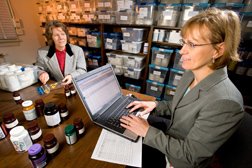Caffeine-Containing Botanicals in Dietary Supplements
|
|
An estimated 50 percent of adults in the United States report that they consume dietary supplements on a regular basis. Some of these supplements contain caffeine—even if it is not listed on the label as an ingredient. To explore caffeine levels in segments of the U.S. dietary supplement market, researchers with the ARS Nutrient Data Laboratory (NDL) analyzed a number of caffeine-containing products in 2004-2005.
In the United States, there is no requirement to state the amount of caffeine present in a food, beverage, or supplement on the product’s label. If caffeine in its pure form is added to a product, however, there is a requirement to add the word “caffeine” to the label’s ingredient listing.
Caffeine is a natural alkaloid that occurs not only in tea and coffee, but also in more than 60 other plants and in plant derivatives, known as “botanicals.” These botanicals, such as guarana, yerba mate, kola nut, and green tea extract, are common dietary-supplement ingredients and their names would be printed on the label’s ingredient listing.
The products analyzed in this study were mostly sports-nutrition and weight-loss products and some vitamin and mineral products, many of which contained complex mixtures of botanicals. Members of NDL’s dietary supplements group, headed by nutritionist Janet Roseland, purchased the products from the same sources that consumers do.
The study provides a snapshot of caffeine levels in a sampling of products, each of which listed at least one caffeine-containing ingredient on the label. Top-selling and randomly selected products were chosen from four categories: health/natural food outlets; supermarkets, drugstores, and mass merchandisers; direct marketers, including catalog and Internet vendors; and practitioners, including fitness clubs.
For this project, NDL researchers collaborated with and received funding from the National Institutes of Health’s Office of Dietary Supplements and the U.S. Food and Drug Administration. The study reported the caffeine values for 53 unnamed U.S. dietary supplements in the journal Analytical and Bioanalytical Chemistry.
According to NDL’s National Nutrient Database, one 8-ounce cup of coffee (240 milliliters) contains about 95 milligrams of caffeine. Of the 53 products analyzed, 27 products provided—by way of a daily serving defined on the label—the caffeine equivalent of about 1 to 2 cups of coffee, 11 products had caffeine equivalents ranging from 2 to 4 cups of coffee, another 11 had equivalents ranging from 4 to 6 cups of coffee, and 4 products provided an amount of caffeine ranging from 7 to 8 cups of coffee.
Of the 28 analyzed products that voluntarily listed a caffeine amount on the label, 25 were found to contain caffeine levels within 20 percent of the label amount.
“Since some consumers may want to limit their caffeine consumption, it’s important for them to check the labels of supplements for caffeine-containing botanical ingredients including guarana, yerba mate, kola nut, and green tea extract,” says Roseland.
Final conclusions about the caffeine content of dietary supplements on the market would require additional research, including analysis of more product samples and monitoring of products over time, according to chemist Karen Andrews, the lead study author.—By Rosalie Marion Bliss, Agricultural Research Service Information Staff..
This research is part of Human Nutrition, an ARS national program (#107) described on the World Wide Web at www.nps.ars.usda.gov.
Janet Roseland and Karen Andrews are with the USDA-ARS Nutrient Data Laboratory, Beltsville Human Nutrition Research Center, 10300 Baltimore Ave., Bldg. 005, Beltsville, MD 20705-2350; phone (301) 504-0715 [Roseland], (301) 504-0710 [Andrews], fax (301) 504-0713.
"Caffeine-Containing Botanicals in Dietary Supplements" was published in the April 2009 issue of Agricultural Research magazine.







